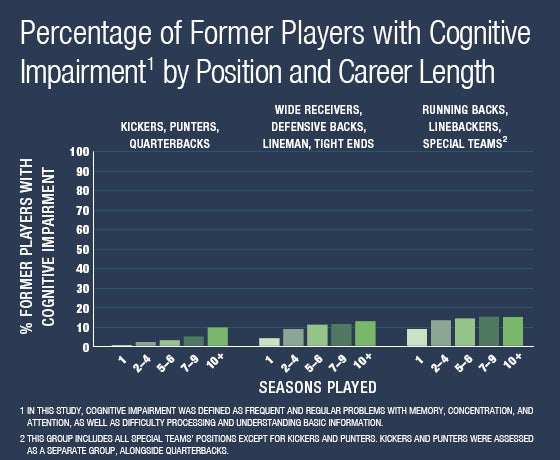Concussion and Long-Term Health
Our analysis of 3,500 former NFL players looked at individuals’ current cognitive and mental health alongside the specific NFL career exposures using the self-reported health and playing data.
What the Science Says
Former players who reported more concussion symptoms during their NFL playing years (loss of consciousness, disorientation, nausea, etc.) were significantly more likely to report having cognitive impairment, depression, and anxiety later in life.
- In comparison to men who played positions with the lowest concussion risk (kicker, punter, and quarterback), running backs, linebackers, and special teams were twice as likely to report having cognitive impairment and 40% more likely to report depression. Wide receivers, defensive backs, linemen, and tight ends were 70% more likely to report cognitive impairment and 40% more likely to report depression when compared to the lowest risk group.
- Having a longer NFL career significantly increased risk of cognitive impairment and depression later in life. With each additional five years of play, the risk for self-reported cognitive impairment increased by 20%, while risk for depression rose by 9%.
Our results suggest certain playing positions for longer careers in football may increase risk for cognitive impairments, anxiety, and depression. While these findings are concerning, note that most players did not report these impairments including those 84% of former players who participated seven years or longer. More research is needed on this topic before reaching any definitive conclusions.
1In this study, cognitive impairment was defined as frequent and regular problems with memory, concentration, and attention, as well as difficulty processing and understanding basic information.
2This group includes all special teams’ positions except for kickers and punters. Kickers and punters were assessed as a separate group, alongside quarterbacks.
Action Items for Former Players
Although you cannot change your NFL playing experience, there are things you can do to be proactive about your cognitive and mental health now:
- Depression and anxiety are common and treatable health conditions that can negatively impact cognitive function. If you think you may be experiencing depression or anxiety, talk to your doctor or a trusted friend.
- If you think you may be experiencing symptoms of cognitive impairment, talk to your doctor about getting a comprehensive neurocognitive evaluation. With proper diagnosis and management, people with cognitive impairment can live happy and fulfilling lives. There are ways to improve your cognitive health. Many relate to lifestyle, including good-quality sleep and regular exercise, as well as maintaining a healthy diet and weight. These behaviors may also help you control blood pressure, another factor that influences cognitive function. Continually challenging your brain to stay active and learn new skills is also known to improve cognitive health. Cognitive function and mental health can be negatively affected by certain physical conditions that disproportionately impact former players, such as sleep apnea and heart disease. Talk with your doctor about getting a comprehensive health evaluation, so that you can be evaluated for any conditions that may be impacting these and other important areas of your health.
- If you need to speak with someone immediately or need help finding a doctor, contact the NFL Life Line, described in the Resources section of the website.

